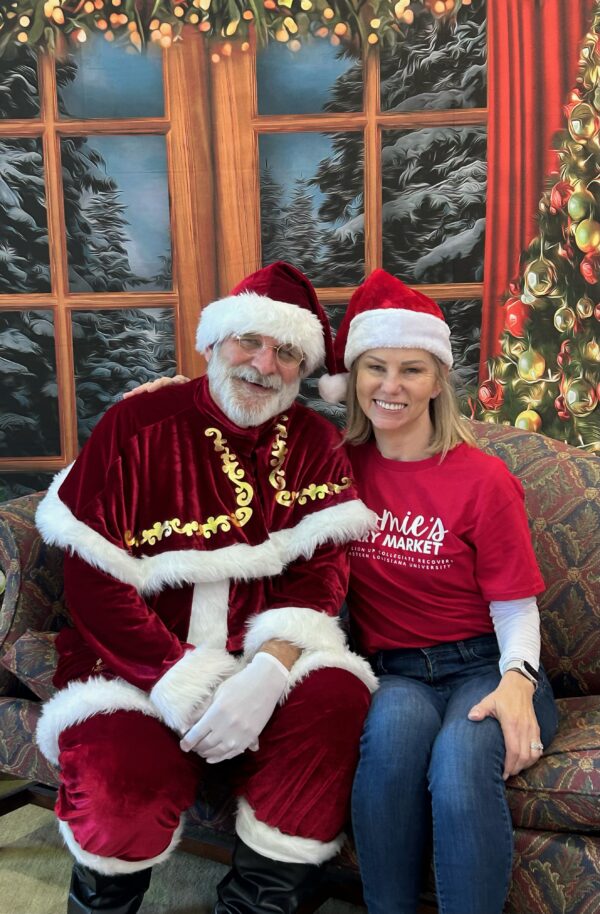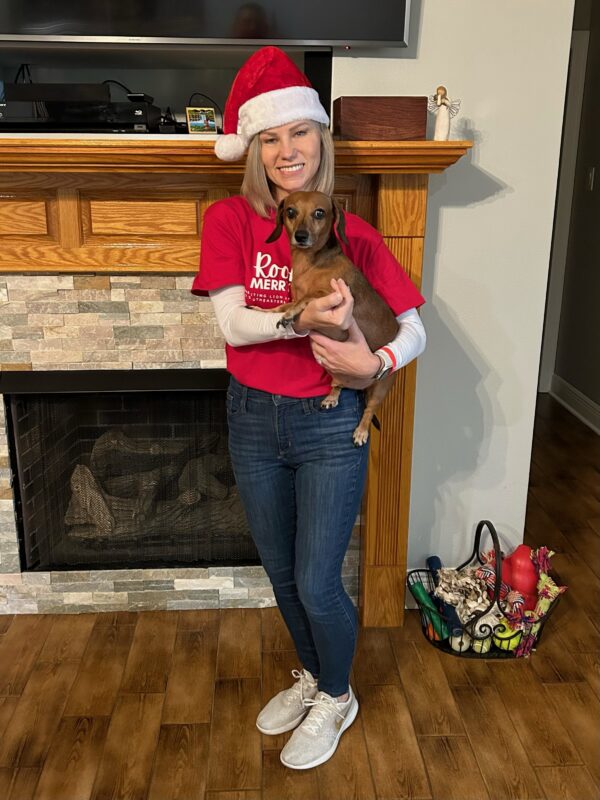Updates
Nov 9, 2023
Navigating the Holidays: Facing Addiction Together
By Grace Alello, BA, CIT

The Holidays are upon us. Thanksgiving, Christmas, Kwanza, Hannukah, or Winter Solstice. Whatever the beliefs or traditions they share, friends and families across the globe gather for rituals and celebrations at this time of year.
For many of us here in the South, the holiday season brings to mind festive decorations, holiday music, turkey, gumbo, gratitude, and time spent with family and friends—many of us, but not all. Individuals who struggle with addiction and those who love them often have a different experience this time of year. For them, the holidays can be a dark and challenging time filled with family conflict, financial strain, fear, isolation, shame, and guilt.
As a person who spent many years struggling with substance use disorder, I’ve spent my fair share of holidays away from home. Lost days spent in a drug-fueled haze, trips to jail, hospital stays, and the occasional act of avoidance driven by shame, resentment, and self-loathing. Birthdays, Easter, Thanksgiving, and Christmas all took a back seat to my addiction at one time or another.
I have a clear memory of the Christmas of 2012. I spent it in an anonymous hotel without a tree, decorations, gifts, or family. Just a pile of dope, a bag of fast food from the jack-in-the-box, and absurdly bittersweet holiday films playing endlessly on the television. As the hours passed, I fought the urge to call my family, to jump in the car and race to the house, just to be around people who cared.
However, having been down that path before, I knew the cost of yielding to my desire. My presence at a family celebration had become the thief of peace and joy. The conversation around the dinner table would become stilted, the air tense, my family again disappointed, and me ashamed. Instead, I ate cold burgers, watched Hallmark movies, and felt profoundly lonely.
I did experience a saving grace my last Christmas in active addiction. I received a text from a family member. The text said, “We know you can’t be here with us physically right now, but you are always in our hearts.” My family’s way of informing me that, while I wasn’t welcome home right then, I also wasn’t forgotten. They were reminding me that they would be there when I was ready.
I’m happy to say that, before the following Christmas, I committed myself to healing. It was and is the best gift I have ever given myself. However, those first few holidays were hard. Accepting recovery meant that I had to deny previous pastimes, mindsets, and personal associations. It took time to trust myself, to earn the trust of others, and to rebuild family relationships. Holidays were challenging to navigate at first. Now, ten years later, I get the satisfaction of helping others to navigate those first few holidays.
Even in the best of times, holidays entail a certain amount of stress. Who hasn’t experienced the pressure of planning a family meal or managing to clean, shop, decorate, and cook in between the responsibilities of daily living? The stress of the holidays is amplified for families affected by substance abuse. Addicted family members are often absent from celebrations or show up unannounced. They may be intoxicated and act inappropriately. Family members of addicted loved ones may feel like they are walking on eggshells, waiting for the next catastrophe. What was meant to be a joyful celebration can quickly devolve into a tense occasion characterized by strain and sorrow. Those in early recovery are also more vulnerable during the holidays. Facing lost intimacy and the fractured relationships that often occur as the collateral damage of addiction can be difficult. The contemplation of abstaining through holidays previously spent partying and drinking with friends can leave one feeling isolated. Without support, the urge to use can be intense.
According to the CDC, the end-of-year holiday season is the most dangerous time of year for drug and alcohol-related deaths. Stressful family dynamics, the easy accessibility of drugs and alcohol, disruptions in routine and access to treatment contribute to the need for proper awareness, planning, and support during the holidays.
____________________
In Early Recovery
____________________
Navigating the holidays in early recovery can be challenging, but it’s also a crucial time for building a strong foundation for sobriety. Here’s a list of helpful tips for individuals in early recovery during the holiday season:
Plan and communicate:
o Plan your holiday season in advance, so you have a clear idea of what to expect and can set realistic expectations.
o Talk to your loved ones about your recovery and your needs during the holidays. Let them know how they can support you.
Stay Accountable:
o Connect with a sponsor, counselor, or support group and maintain regular contact during the holiday season for added accountability.
Avoid High Risk Situations:
o Identify triggers and situations that may lead to relapse and make a plan to avoid or cope with them.
Attend Sober Events:
o Seek out sober, holiday events, and gatherings to be in a supportive and substance free environment.
Have an exit strategy:
o Plan an exit strategy for situations that become uncomfortable or tempting. You can always leave early.
Set Boundaries:
o It is essential to set boundaries with family and friends, who may not fully understand your recovery. Politely declined events or situations that may jeopardize your progress.
Practice Self-Care:
o Take care of your physical and emotional well-being. Get enough, sleep, eat well, and engage in regular exercise and relaxation techniques.
o Faith is an important part of recovery. Engaging in spiritual practices such as prayer, meditation, and fellowship are ways to feed your soul.
Volunteer:
o Get back to your community by volunteering during the holidays. It can be a fulfilling way to spend your time.
Have a support system:
o Keep the contact information of your sponsor, pastor or a supportive friend readily available in case you need someone to talk to you in a moment of crisis.
o Lean on your support system, including friends, family, and recovery peers, during difficult moments.
Celebrate Sobriety:
o Celebrate your recovery milestones and the progress you’ve made. Acknowledge and reward yourself for your efforts by doing something you love, such as reading a good book, taking a bubble bath, or taking your dog to the park.
Remember that you are not alone in your journey, and there are people and resources available to help you through the holidays in early recovery. Prioritizing your sobriety and well-being during this time is a significant step toward a healthier and happier future. If you find yourself struggling or at risk of relapse, don’t hesitate to reach out to a counselor or treatment professional for additional support.
____________________
For the Friends and Family –
Supporting Your Loved One
____________________
Supporting a loved one in active addiction or early recovery during the holidays can be challenging. Here are some helpful tips for family members and friends to navigate this period while providing love and assistance:
Educate Yourself
o Learn about addiction and its effects. Understanding the disease can help you approach the situation with empathy and knowledge.
Practice Compassion
o Try to empathize with your loved one’s struggles without enabling their addictive behaviors. Compassion can foster communication and trust.
Avoid Judgment
o Avoid judgmental or accusatory language. Addiction is a complex issue, and blame can hinder the recovery process.
Set Boundaries
o Establish clear, healthy boundaries to protect yourself emotionally, mentally, and physically. This may include avoiding enabling behaviors.
Support Professional Help and/or Celebrate Recovery
o Offer help, not ultimatums. If your loved one is still struggling, encourage them to seek professional help such as addiction treatment, therapy, or counseling. Make it clear that you want them to get better.
o If your loved one is still early in their recovery journey, acknowledge their effort and celebrate milestones. Small victories are important steps toward a healthier life.
Be Patient
o Recovery is a process, and there may be setbacks. Be patient and supportive as they navigate the challenges.
Prepare for Crisis
o An unfortunate reality of loving someone with alcohol or substance use disorder is that no amount of planning is foolproof. Have a plan in case of a crisis and know how to access professional help if necessary.
Remember that supporting a loved one in addiction or recovery is a complex and emotional journey. There is no right or wrong way to do this and what we offer here are just a few practical tips. The most important thing is to approach the situation with love, patience, and a genuine desire to help. Your support can make a significant difference in their recovery process.
____________________
For the Friends and Family–
Supporting Yourself
____________________
Taking care of oneself is crucial for family members dealing with a loved one’s addiction or recovery during the holidays. Here are a few ways family members can prioritize their own well-being:
Seek Support
o We all need support to navigate challenging times. Join a support group for family members of individuals with addiction. Groups like Al-Anon, Nar-Anon or PAL can provide a safe space to share experiences, gain insight, and receive support from others who understand what you’re going through.
Set Boundaries
o There’s a reason you are seeing this one again, it’s important! Establish and maintain healthy boundaries with your loved one in addiction or recovery. Clearly communicate what you will and won’t tolerate to protect your emotional and mental well-being.
Practice Self-Care
o Make self-care a priority. Ensure you’re getting enough sleep, eating well, and engaging in activities that bring you joy and relaxation. This can help reduce stress.
o Implement stress management techniques such as deep breathing, prayer, yoga, or meditation to cope with the stress and anxiety associated with your loved one’s situation.
o Don’t hesitate to take breaks when needed. Sometimes, stepping away from a challenging situation can provide much-needed perspective and relief.
Set Realistic Expectations
o Manage your expectations for the holiday season. Understand that it may not be picture-perfect, and that’s okay.
o Understand that you can’t control your loved one’s choices or actions. Your role is to support, not to fix their problems.
Practice Gratitude
o Focus on what you’re grateful for in your life. Gratitude can be a powerful tool for maintaining a positive outlook.
Avoid Isolation
o Isolation is the enemy. It can worsen feelings of stress and depression. Stay connected with others and avoid withdrawing from your support system.
Know When to Seek Professional Help
o If you’re struggling to cope with your loved one’s addiction or recovery, consider seeking help from a therapist or counselor who specializes in addiction and family dynamics.
You never have to do this alone!
Remember that taking care of yourself is not selfish; it’s essential for your well-being and your ability to support your loved one effectively. By prioritizing self-care, you’ll be in a better position to provide the love and support your family member needs during their recovery journey.
____________________
Written by: Grace Alello, BA, CIT
About the Author
Grace Alello is a former residential counselor and current Family Day volunteer at The Grove. As a person in long-term recovery, Grace appreciates the challenges inherent in acquiring a life of sobriety and satisfaction. Grace recently returned to Southeastern Louisiana University to pursue a Master’s degree in clinical mental health counseling with plans to return to The Grove to continue offering our clients and their families the support they need on their recovery journey. Grace continues working a recovery program and spends her free time reading, socializing, and loving on her pets.
